QuestionMy name is Andrea and I live in CT. I am currently hand-raising a few-days old field/deer mouse. I've done tons of research and found some really great online resources - but I like to have as much info as possible, in order to manage my expectations about my little pink friend.
I'm fairly certain that a little mouse family was nesting in my husband's garaged car. He just drove it the other day, for the first time in a long time. When he was arriving back home (an hour or so after leaving), he noticed a tiny pink thing in the driveway. He looked closer and realized it was a newborn mouse (my guess is less than 24 hours old). After more investigation, he tragically found this little guy's siblings in the road - they weren't so lucky.
Anyway, once my husband showed me the little mouse, I couldn't just walk away. We are a family of HUGE animal lovers (we own cats, dogs, gerbils, hamsters, a bearded dragon and a fish!), so doing nothing was not an option for me. But I suspected my chances for success were going to be minimal, if not non-existent. When I learned that it WAS possible to hand-raise them from such a young age, I knew I had to at least try. So, that's what I've been doing.
That was on Friday. As of today, the little baby is seemingly doing great. I keep him/her in a Rubbermaid shoebox (with a lid with holes), on a nice pile of super-soft bedding, on top of an insulated heating pad (set on low). I've been feeding him/her around the clock, every two hours. I'm feeding a mix of KMR and electrolyte replacement. I'm feeding with a tiny paint brush for him/her to suckle on. So far, it's working great. I've also been massaging his/her little belly and he/she has been eliminating regularly. So far, this little baby has proven to be super-tough and vibrant - he/she squirms and kicks and crawls around like a maniac.
So, here's what I'm wondering, after all of my research. I've read that the success rate with what I'm doing is only about 25% or so. I've read that, even though the babies might appear to be doing well for the first few days, things can suddenly go sideways because of things like bloat and dehydration. I guess I just want to know, very specifically, what I should be looking for, in terms of danger signs. And if I DO run into danger, what is the absolute most I can do to try and turn things around?
And my biggest question of the day: his/her little milk belly doesn't really ever go away. Does that mean there's a problem? He/she is eliminating regularly and eating fine. But should I be able to still see the milk in the belly, even after 2 hours have passed since the last feeding?
Looking forward to your reply...I really hope this little baby makes it!!
AnswerHi Andrea,
First of all - wow! You are doing an amazing job, and it's so wonderful to hear the pup is doing well so far. The thing with pups is that since they are so fragile, you don't have much time to troubleshoot if you start to see warning signs. Since you don't have much time to determine what is going wrong, your best bet is to have an expert near you on standby. I'd recommend talking with your local pet shops, animal rescues (even dog and cat rescues frequently get pocket pets as well!), rehabbers, and vets to see if they or someone they know has raised orphaned pups before and can help out. That way, if you see something going wrong at 2 AM you don't have to wait until morning for aid from someone who may have seen the problem before. The good news is that once the coat comes in and the eyes open up the chances for life-threatening problems go way down! Each day that pup is putting on weight is a step closer to being out of the woods, so to speak.
As far as warning signs, you want to make sure the baby is gaining weight each day. Weight loss can be tough to notice when you are talking grams, and can often be the first sign that something is going wrong. You can purchase a food scale from your local general or grocery store, but be sure it measures in grams. Place some kind of bowl or container on the scale with something warm in the bottom (placing a pup on metal can suck the heat right out of him) and tare it to zero, then weigh before each feeding. I find that keeping a log right by the cage/box makes everything simpler! Weight loss can be indicative of a dietary problem, illness, or a failure to thrive (which is frequently genetic but not horribly common).
Another thing to look for is activity. Every mouse is different, but you generally want to see good naps between meals and quick responsiveness to stimuli (like being handled or fed), with usually a little wiggling and squirming before a meal if he gets a little hungry. It sounds like he is active, responsive, and eating well - all great signs! If you notice his responses or activity suddenly drop, and he doesn't want to move or eat, he's in the danger zone for any number of reasons and your best bet is to keep him warm and consult a local expert.
The only other thing I would watch for is dietary - keep an eye on his waste for runny or discolored stools that might mean his tummy is adjusting. This can happen anyways in the first couple of days, but typically mean an adjustment in his formula is needed. Bloat or constipation can be helped with a gentle stroking down either side of his belly. I've only encountered the problem once, adjusted the formula, and given the gentle massage and he bounced back like nothing had happened.
As far as the milk belly - he's getting meals around the clock (as he should, of course), and his digestive system only kicks on during feeding itself, so this is completely normal. He should have a happy milk belly - you're doing great!
I hope I got all of your questions answered, but write me a followup if I missed something and I will get right back to you! :)
-Tam

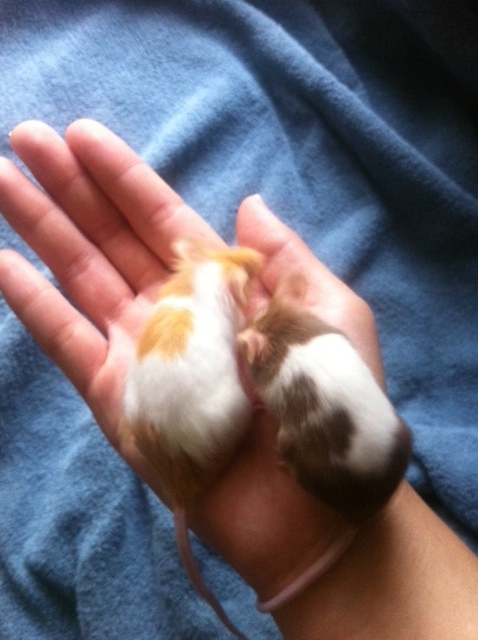 My mice are sneezing and making weird clicking noises
Questionmice
QUESTION: I just bought two female
My mice are sneezing and making weird clicking noises
Questionmice
QUESTION: I just bought two female
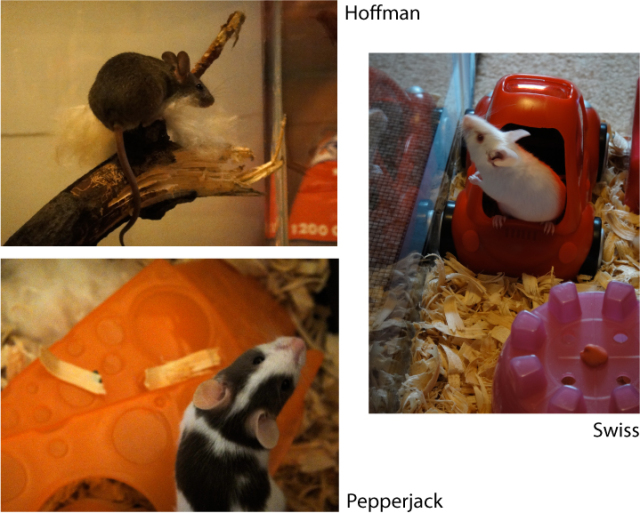 Sneezing/Diet/Taming (mice)
Question
The Babies
Hi Natasha,
Im pleased to find som
Sneezing/Diet/Taming (mice)
Question
The Babies
Hi Natasha,
Im pleased to find som
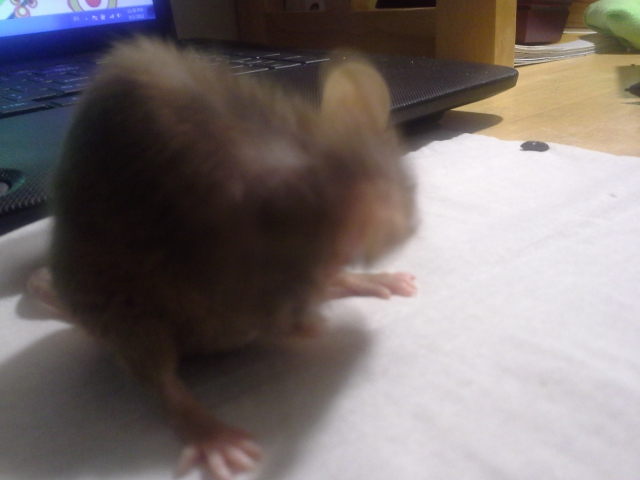 My mice wont stop scratching herself
QuestionThis is brownie in her
QUESTION: Hello N
My mice wont stop scratching herself
QuestionThis is brownie in her
QUESTION: Hello N
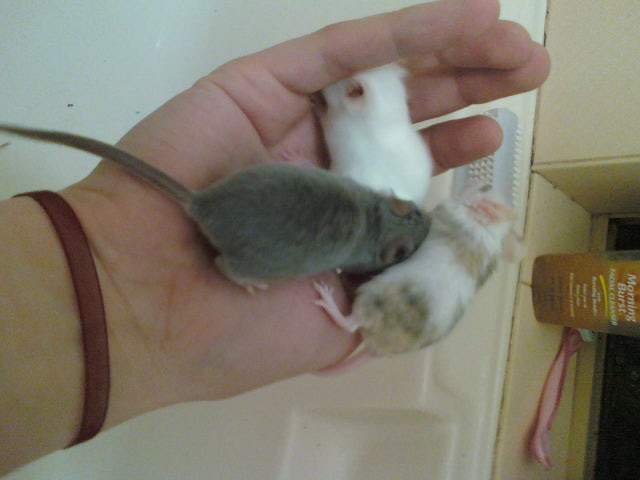 Mice behaviour (possibly bullying?)
QuestionMy 3 mice
QUESTION: Hey,
I recently got
Mice behaviour (possibly bullying?)
QuestionMy 3 mice
QUESTION: Hey,
I recently got
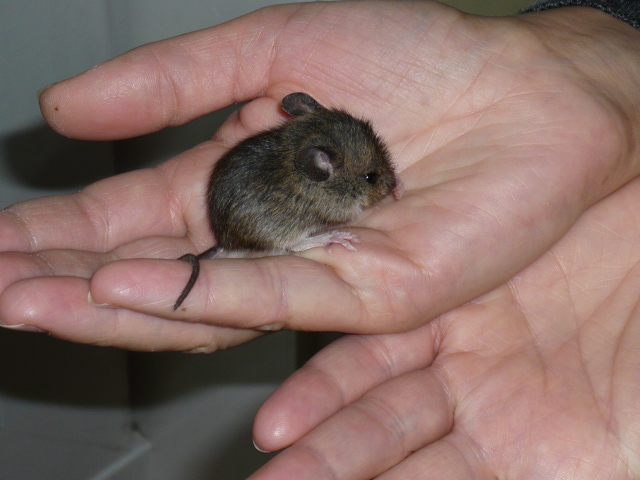 grown up orphan wild mouse
Question
baby mouse
Hi Natasha,
I was running a
grown up orphan wild mouse
Question
baby mouse
Hi Natasha,
I was running a